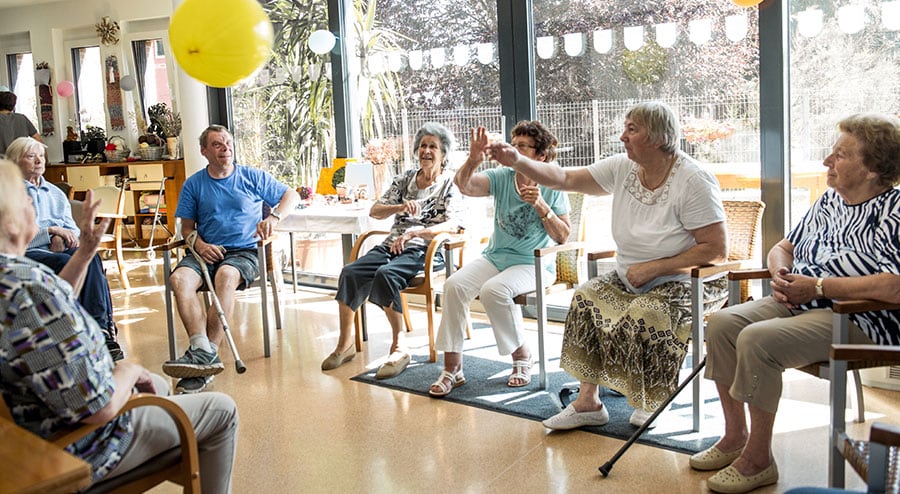Specialized Memory Care services for seniors with Alzheimer’s and dementia.
Helped Living: a Compassionate Environment for Seniors With Memory Challenges
Aided living centers increasingly serve as compassionate settings customized to the special requirements of seniors grappling with memory obstacles. By supplying customized care and organized routines, these communities not just boost cognitive feature but also foster psychological connections, decreasing seclusion amongst locals. Specialized approaches, such as songs treatment and reminiscence techniques, are used by skilled staff to promote much deeper communication. The efficiency of these treatments typically hinges on the participation of families in the care procedure, triggering a more detailed evaluation of just how this collaborative initiative affects results for both homeowners and liked ones.
Recognizing Memory Challenges
Comprehending memory difficulties is crucial for providing efficient treatment to elders encountering cognitive decrease. Memory impairments, which can materialize as lapse of memory, complication, or trouble recalling recent events, are typically signs and symptoms of problems such as Alzheimer's condition or other forms of dementia. These challenges can substantially affect an elderly's capacity to execute day-to-day jobs, maintain social relationships, and manage personal safety.
Recognizing the various stages of cognitive decline is important for caretakers and health care experts. Early-stage amnesia may include moderate forgetfulness, while mid-stage decline can result in extra noticable disorientation and complication. In late-stage dementia, individuals may lose the ability to connect properly, calling for detailed assistance and understanding from caregivers.
This demands a caring approach to care that focuses on the emotional well-being of the person. Ultimately, a deep understanding of these obstacles is essential to delivering thoughtful and effective care for senior citizens facing cognitive decrease.
Benefits of Assisted Living
Assisted living deals various benefits for seniors with memory obstacles, offering an encouraging atmosphere that cultivates self-reliance while ensuring security and care. One of the key advantages is the day-and-night guidance and support readily available, which helps minimize risks connected with memory-related issues. Assisted Living. This consistent support enables elders to participate in daily tasks without the fear of mishaps or complication
Additionally, helped living centers frequently supply organized routines that can improve cognitive feature and stability. These routines aid residents feel even more safe and secure and decrease stress and anxiety, as they recognize what to expect daily. Social interaction is one more substantial benefit, as these atmospheres urge connections among locals, advertising psychological well-being and decreasing feelings of seclusion.
In addition, aided living staff are trained to acknowledge the one-of-a-kind demands of seniors with memory challenges, enabling for customized treatment strategies that resolve individual preferences and requirements. This tailored technique not just improves the top quality of treatment yet additionally encourages elders to keep a feeling of freedom. On the whole, assisted living acts as a compassionate service, balancing the need for support with the desire for independence in the lives of seniors facing memory challenges.
Specialized Care Approaches
Implementing specialized care approaches is crucial for properly supporting seniors with memory difficulties. These personalized strategies concentrate on enhancing the lifestyle and fostering freedom while addressing the distinct needs of people with cognitive problems. One fundamental method is person-centered care, which stresses the relevance of recognizing each citizen's life history, choices, and values. By customizing care plans as necessary, team can produce a much more interesting and significant setting.
An additional important technique includes making use of cognitive excitement treatments. Activities created to enhance memory recall, urge social communication, and promote imagination can considerably influence citizens' overall well-being. Techniques such as memory treatment utilize individual memories to stimulate discussion and link, while music treatment can stimulate emotions and memories, providing comfort.

Creating a Helpful Community
(Dementia Care Charlotte)An encouraging community plays a vital function in enhancing the lives of elders with memory difficulties. Such a neighborhood cultivates a setting of understanding, compassion, and support, which is crucial for people dealing with cognitive problems. By developing a network of assistance, assisted living centers can considerably improve the quality of life for residents.
Central to an encouraging neighborhood is the visibility of trained staff that are delicate to the distinct needs of seniors with memory disabilities. These professionals not just provide vital care but also involve residents in significant tasks that boost cognitive feature and advertise social interaction. Programs that motivate participation in team workouts, arts and crafts, or memory games can improve both physical and mental well-being.
Moreover, a helpful neighborhood advertises strong links amongst citizens. Urging relationships find out and peer assistance helps to minimize sensations of isolation and promotes a sense of belonging. Normal gatherings and public dining experiences can further reinforce these bonds, developing an environment where elders really feel valued and understood.
Involving Households in Care
Engaging households in the treatment process is necessary for offering comprehensive assistance to elders with memory challenges. Relative commonly offer as important advocates, offering insights into the person's preferences, background, and regimens that can enhance individualized treatment. By including them in conversations and treatment planning, assisted living facilities can create an extra all natural method that reverberates with the local's requirements.

Encouraging family members to take part in care not only enhances the wellness of the senior yet likewise gives psychological support to member of the family. Entailing family members in care cultivates a feeling of neighborhood and belonging, making sure that elders feel connected to their enjoyed ones. Eventually, a collective approach to care enhances the lives of both residents and their households, developing a compassionate and helpful setting that advertises dignity and respect.
Final Thought
Finally, aided living functions as an important source for elders experiencing memory obstacles, offering customized care tailored to private demands. The organized regimens and interesting activities promote cognitive function and emotional wellness, promoting a sense of belonging. Specialized care techniques, such as memory and songs treatment, boost interaction and link. By entailing family members in the treatment procedure, aided living develops a thorough assistance network, inevitably improving the lives of homeowners and their enjoyed ones.